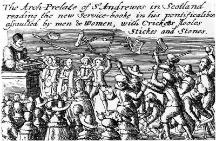Guns, sermons and indecent behaviour: Conduct and Space in Scottish churches, 1638-1660

Wednesday 13 March 2013, 4.30PM
Speaker(s): Chris Langley (York)
CREMS Seminar
As Reformed theologians made strenuous efforts to remove themselves from notions urging the ‘beauty of holiness’, historians have only recently started to appreciate the continuing significance of Reformed spaces. While worship spaces were less ‘decorative’, the actions that took place within the spaces – and the context in which they were enacted – held continued significance.
The mid-seventeenth century saw a new emphasis on the church space emerge in Scotland. From the signing of the National Covenant in 1638, the Presbyterian faction within the Kirk of Scotland came to the fore. While historians have recognised the political desires of this new leadership, their commitment to reforming notions of space is less appreciated. Burial customs, clerical and lay behaviour within the church interior and general upkeep all came under the spotlight of so-called ‘Covenanted’ legislation. Good behaviour and decorum within the church space would be reflected in a godlier, reformed, community.
Attempts at reforming attitudes to spatial aspects of worship encountered significant challenges, all relating to differing readings of space. In addition to the usual problems in attempting to enforce entire congregations to concentrate during a sermon, opponents of the Kirk leadership subverted space as part of a wider, political, challenge. Nonconformist ministers made use of spatial aspects of worship to continue practices prohibited by the new Kirk leadership. Lay opponents strategically interrupted or walked out of sermons in protest against the Kirk’s political ambitions. Others arrived with firearms or, as in the case of English troops in the 1650s, sat in the seats of prominent locals loyal to the Kirk leadership.
This multi-layered relationship underlines how, despite removing much of its theological underpinning, Calvinist communities continued to interact with the worship space. More importantly, these interactions continued to hold significance and meaning when subverted or manipulated.
Brief Biography: Chris Langley is Teaching Fellow in Early Modern History at the University of York. He has written articles on aspects of seventeenth-century religion in Archiv für Reformationsgeschichte and Scotland’s Long Reformation edited by John McCallum. The author is currently completing an edited volume entitled The Minutes of the Synod of Lothian and Tweeddale, 1648-1659 to be published by Boydell Brewer. His monograph, Worship, War and Community in Scotland, 1638-1660 is currently being revised for press.
Refreshments available 15 mins before the start
Location: Berrick Saul, BS/008
Email: crems-enquiries@york.ac.uk
